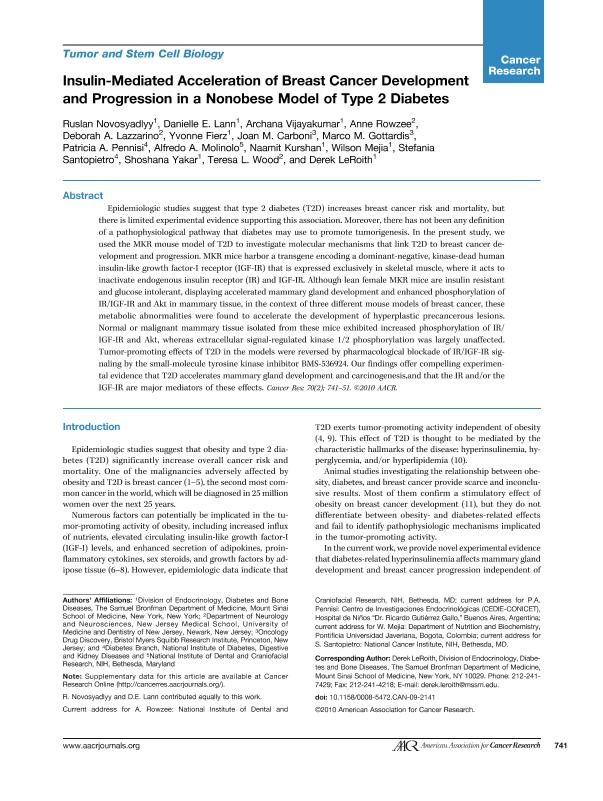Mostrar el registro sencillo del ítem
dc.contributor.author
Novosyadlyy, Ruslan
dc.contributor.author
Lann, Danielle E.
dc.contributor.author
Vijayakumar, Archana
dc.contributor.author
Rowzee, Anne
dc.contributor.author
Lazzarino, Deborah A.
dc.contributor.author
Fierz, Yvonne
dc.contributor.author
Carboni, Joan M.
dc.contributor.author
Gottardis, Marco M.
dc.contributor.author
Pennisi, Patricia Alejandra

dc.contributor.author
Molinolo, Alfredo A.
dc.contributor.author
Kurshan, Naamit
dc.contributor.author
Mejia, Wilson
dc.contributor.author
Santopietro, Stefania
dc.contributor.author
Yakar, Shoshana
dc.contributor.author
Wood, Teresa L.
dc.contributor.author
LeRoith, Derek
dc.date.available
2020-10-26T15:05:18Z
dc.date.issued
2010-01
dc.identifier.citation
Novosyadlyy, Ruslan; Lann, Danielle E.; Vijayakumar, Archana; Rowzee, Anne; Lazzarino, Deborah A.; et al.; Insulin-Mediated Acceleration of Breast Cancer Development and Progression in a Nonobese Model of Type 2 Diabetes; American Association for Cancer Research; Cancer Research; 70; 2; 1-2010; 741-751
dc.identifier.issn
0008-5472
dc.identifier.uri
http://hdl.handle.net/11336/116809
dc.description.abstract
Epidemiologic studies suggest that type 2 diabetes (T2D) increases breast cancer risk and mortality, but there is limited experimental evidence supporting this association. Moreover, there has not been any definition of a pathophysiological pathway that diabetes may use to promote tumorigenesis. In the present study, we used the MKR mouse model of T2D to investigate molecular mechanisms that link T2D to breast cancer development and progression. MKR mice harbor a transgene encoding a dominant-negative, kinase-dead human insulin-like growth factor-I receptor (IGF-IR) that is expressed exclusively in skeletal muscle, where it acts to inactivate endogenous insulin receptor (IR) and IGF-IR. Although lean female MKR mice are insulin resistant and glucose intolerant, displaying accelerated mammary gland development and enhanced phosphorylation of IR/IGF-IR and Akt in mammary tissue, in the context of three different mouse models of breast cancer, these metabolic abnormalities were found to accelerate the development of hyperplastic precancerous lesions. Normal or malignant mammary tissue isolated from these mice exhibited increased phosphorylation of IR/IGF-IR and Akt, whereas extracellular signal-regulated kinase 1/2 phosphorylation was largely unaffected. Tumor-promoting effects of T2D in the models were reversed by pharmacological blockade of IR/IGF-IR signaling by the small-molecule tyrosine kinase inhibitor BMS-536924. Our findings offer compelling experimental evidence that T2D accelerates mammary gland development and carcinogenesis,and that the IR and/or the IGF-IR are major mediators of these effects.
dc.format
application/pdf
dc.language.iso
eng
dc.publisher
American Association for Cancer Research

dc.rights
info:eu-repo/semantics/openAccess
dc.rights.uri
https://creativecommons.org/licenses/by-nc-sa/2.5/ar/
dc.subject
Insulin
dc.subject
Breast cancer
dc.subject
IGF-1
dc.subject
Type 2 Diabetes
dc.subject.classification
Endocrinología y Metabolismo

dc.subject.classification
Medicina Clínica

dc.subject.classification
CIENCIAS MÉDICAS Y DE LA SALUD

dc.title
Insulin-Mediated Acceleration of Breast Cancer Development and Progression in a Nonobese Model of Type 2 Diabetes
dc.type
info:eu-repo/semantics/article
dc.type
info:ar-repo/semantics/artículo
dc.type
info:eu-repo/semantics/publishedVersion
dc.date.updated
2020-02-07T13:48:10Z
dc.journal.volume
70
dc.journal.number
2
dc.journal.pagination
741-751
dc.journal.pais
Estados Unidos

dc.journal.ciudad
Philadelphia
dc.description.fil
Fil: Novosyadlyy, Ruslan. Icahn School of Medicine at Mount Sinai; Estados Unidos
dc.description.fil
Fil: Lann, Danielle E.. Icahn School of Medicine at Mount Sinai; Estados Unidos
dc.description.fil
Fil: Vijayakumar, Archana. Icahn School of Medicine at Mount Sinai; Estados Unidos
dc.description.fil
Fil: Rowzee, Anne. Rutgers University; Estados Unidos
dc.description.fil
Fil: Lazzarino, Deborah A.. Rutgers University; Estados Unidos
dc.description.fil
Fil: Fierz, Yvonne. Icahn School of Medicine at Mount Sinai; Estados Unidos
dc.description.fil
Fil: Carboni, Joan M.. Bristol Myers Squibb Research Institute; Estados Unidos
dc.description.fil
Fil: Gottardis, Marco M.. Bristol Myers Squibb Research Institute; Estados Unidos
dc.description.fil
Fil: Pennisi, Patricia Alejandra. Consejo Nacional de Investigaciones Científicas y Técnicas. Oficina de Coordinación Administrativa Parque Centenario. Centro de Investigaciones Endocrinológicas "Dr. César Bergada". Gobierno de la Ciudad de Buenos Aires. Centro de Investigaciones Endocrinológicas "Dr. César Bergada". Fundación de Endocrinología Infantil. Centro de Investigaciones Endocrinológicas "Dr. César Bergada"; Argentina
dc.description.fil
Fil: Molinolo, Alfredo A.. National Institute of Dental and Craniofacial Research; Estados Unidos
dc.description.fil
Fil: Kurshan, Naamit. Icahn School of Medicine at Mount Sinai; Estados Unidos
dc.description.fil
Fil: Mejia, Wilson. Icahn School of Medicine at Mount Sinai; Estados Unidos
dc.description.fil
Fil: Santopietro, Stefania. No especifíca;
dc.description.fil
Fil: Yakar, Shoshana. Icahn School of Medicine at Mount Sinai; Estados Unidos
dc.description.fil
Fil: Wood, Teresa L.. Rutgers University; Estados Unidos
dc.description.fil
Fil: LeRoith, Derek. Icahn School of Medicine at Mount Sinai; Estados Unidos
dc.journal.title
Cancer Research

dc.relation.alternativeid
info:eu-repo/semantics/altIdentifier/doi/http://dx.doi.org/10.1158/0008-5472.CAN-09-2141
dc.relation.alternativeid
info:eu-repo/semantics/altIdentifier/url/https://cancerres.aacrjournals.org/content/70/2/741
Archivos asociados
